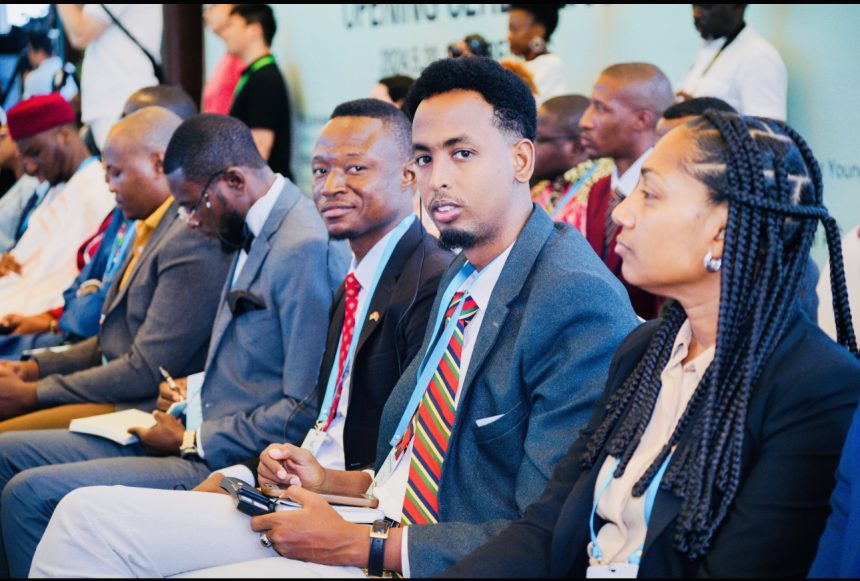I landed in Beijing on May 18, I had the privilege of representing Somalia at the China-Africa Youth Festival, an initiative aimed at fostering stronger ties between African nations and China. My journey began in Beijing and took me through a variety of cultural and educational experiences, facilitated by the warm and dedicated volunteers who ensured our comfort and engagement throughout the trip.
Upon landing in Beijing, we were warmly welcomed by the event organizers and volunteers. Our first evening was marked by a welcome dinner along with setting a positive tone for the days ahead.
We started our day early with a visit to the iconic Juyongguan section of the Great Wall. The sheer scale and historical significance of the Wall left us in awe. we proceeded to the National Committee of the Chinese People’s Political Consultative Conference (CPPCC). Here, we had insightful interactions with the China-Africa Friendship Group, discussing the importance of our countries’ partnerships.
Our evening was spent at Peking University, where we engaged in fruitful exchanges with students and faculty, followed by a delightful dinner.
We visited the Museum of the Communist Party of China, gaining a deeper understanding of China’s political history. Post-lunch near the Beijing South Railway Station, we boarded a high-speed train to Jinhua, marking the beginning of our journey in Zhejiang province.
Our day began with a welcome ceremony at the Jinhua Administration Institute. We then explored the Common Prosperity Belt in Jindong and had a buffet lunch at the picturesque White Forest Town of San San Fami. The afternoon included a visit to Leapmotor, showcasing China’s advancements in electric vehicles. The day concluded at Zhejiang Normal University, where we visited the African Museum and engaged in various cultural exchanges.
We experienced a blend of Chinese and African cultures at the Wu Opera Grand Theatre, where we were treated to captivating performances. This cultural immersion was a highlight of the trip, reflecting the rich heritage and artistic expressions of both regions.

Our itinerary included a visit to the Zhejiang Guangsha Vocational and Technical University of Construction, where we learned about traditional woodcarving techniques. The day also involved exploring the Yiwu International Trade Market, providing insights into China’s robust e-commerce and trade practices.
The final day was marked by the China-African Youth Dialogue at the Your World International Conference Centre. This dialogue provided a platform for exchanging ideas and forging connections that would further our collaborative efforts. The festival concluded with a closing ceremony and a group photo, symbolizing the unity and shared aspirations of our nations.
This enriching experience would not have been possible without the meticulous planning and support of the organizers and volunteers. Their dedication ensured that our stay was comfortable and our engagements meaningful. The China- Africa Youth Festival not only strengthened the bonds between our nations but also left us with lasting memories and a deeper appreciation for each other’s cultures.
In representing Somalia at the China-Africa Youth Festival, I felt a profound sense of pride and responsibility. The festival highlighted the potential of youth in driving change and fostering international cooperation. I return home with new friendships, valuable knowledge, and a commitment to contribute to the ongoing partnership between Africa and China.
What I have learned from China can greatly benefit my country. One of the most striking observations was the importance of rule and law in fostering a stable and prosperous society. China’s legal framework ensures order and predictability, creating an environment where businesses can thrive and citizens feel secure.
The country’s infrastructure development is another area that impressed me. From the extensive and efficient high-speed rail network to the modern urban facilities, China’s focus on building robust infrastructure has facilitated economic growth and improved the quality of life for its people. Investing in infrastructure in Somalia could similarly boost our economy and connectivity.
Digital development in China is also noteworthy. The widespread use of technology in everyday life, from mobile payments to smart city initiatives, has streamlined many processes and increased efficiency. Embracing digital development in Somalia could enhance government services, improve business operations, and expand access to information for our citizens.
Additionally, China’s booming business environment, characterized by a mix of large corporations and thriving startups, provides a model for fostering entrepreneurship and innovation. By creating a supportive ecosystem for businesses, Somalia can stimulate economic growth and create job opportunities for its youth.
In summary, the lessons learned from China regarding the rule of law, infrastructure development, digital innovation, and business growth are invaluable. By adopting and adapting these practices, I hope to contribute to Somalia’s development and help build a brighter future for our nation.
By: Ahmed Hassan wehlie (Jubba) Influencer , wehlie.ahmed@gmail.com





